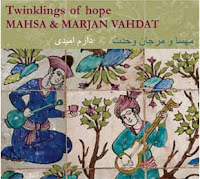In review--Forbidden Singers
Kirkelig Kulturversted (Norway)
Not legally permitted to share
their immaculate vocals with the Iranian public, the Vahdat sisters have
recorded and released albums on the Norwegian label, Kirkelig
Kulturversted. In 2003, founder of KKV,
Erik Hillestad, discovered the Iranian sister vocalists when he produced the
album Lullabies from the Axis of Evil. The album that brought light to the humanity
present in the countries the former US President George Bush, Jr. deemed evil,
launched the Vahdat sisters’ international career. Since that time, the Vahdat sisters have
released several recordings on KKV and their latest, Twinkling of hope features ancient and contemporary Persian/Iranian
poetry performed on traditional instruments and sung in a traditional voice.
The irony of the Iranian
government’s law forbidding women to sing in public ensures that the Iranian
people experience only half of their humanity.
Each of us is comprised of female and
male halves; when men oppress women, they steal also from their own souls. Imagine a people forbidden to hear the female
interpretation of the spiritual longing found in the poetry of Hafiz or Rumi on
stage. While I won’t launch into a
lecture on this topic, I encourage anyone reading this to support the
courageous Vahdat sisters who break the law anytime they sing on a public stage
in their country. Sadly, these talented
sisters not only sing in a traditional style that takes years, if not decades,
to master, but they compose and co-compose the music that accompanies these
spiritual poems.
I am fortunate that as an
American (so far), that I can listen to and review the Vahdat sister
recordings. If the sisters toured to my
part of the world, I could freely attend the concert, even if I don’t
understand a word of the language in which the sisters sing the songs. I can enjoy the music with my little
knowledge of the sisters’ homeland, politics, and culture. However, having watched different ethnic
groups enjoy the music of their corresponding homelands at festivals and
special gatherings, I noticed that when people and their music reunite,
something magical happens, that isn’t fully understood by outsiders. Tears flow, hearts open, and bonds form. To take this right away from a people breaks
my heart. It breaks everyone’s heart even
without her knowledge.
The sisters appear with
their ensemble on this album, featuring Atabak Elyasi on setar (traditional
lute), Pasha Hanjani on ney-flute, and Ali Rahimi on daf (drum) and percussion.
The overall sound feels contemplative while setting a spiritual space for the
Persian poetry of yearning that appears on the album. The sisters sing solo, in tandem, sometimes
harmonizing, or in musical conversation, not confused with call & response
vocals where vocalists repeat phrases back and forth. While each song flows beautifully into the
next, I especially enjoyed the songs Garden
of Visions, Lullaby, Golden Straws of Wheat, Crane, Come, My Beloved, and
the titular song. The musicians provide
the text in its original language and English translations in the CD
booklet. Immerse yourself in these
exquisite songs.




Comments
Post a Comment